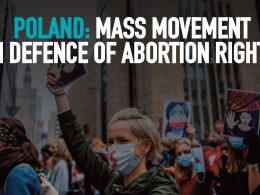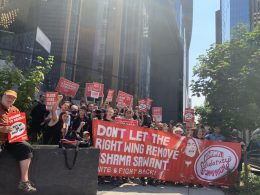By Keely Mullen, Socialist Alternative (our sister organisation in the United States)
In kicking abortion rights back to the states, the right hoped that they’d see a clear path to near-total abortion bans across the country. Well, the results this week in Kansas should serve as a kick in the teeth.
In a landslide victory, and with record voter turnout, Kansans overwhelmingly rejected a ballot measure that would have removed abortion rights from the state constitution. Despite appearing on a traditionally low-turnout primary ballot and being written to confuse voters, the thunderous rejection of this measure is impossible to dispute.
The measure was defeated by 18% in a state that voted for Trump in 2020 by a margin of just under 15%. This shows clear as day that working people in the U.S. do not support taking away access to safe, legal abortions even in “Trump country.” And it demonstrates the difficult position the right finds itself in having made this their mission.
Knowing that they have nothing to offer working class people to overcome skyrocketing prices and chronically low wages, a section of the Republican Party has pinned its hopes on culture war issues as a way to win elections. As the vote in Kansas shows, this is not a straightforward strategy. Some prominent Republican figures have warned that these attacks could backfire, but many others don’t see another way forward and are doubling down.
While there are several other states with abortion related referenda coming up this fall, namely Kentucky and Michigan, in many states the question of abortion rights is not being put directly to voters. Most Republican legislatures would prefer to legislate their way to near-total bans. But regardless of the exact mechanism they use, the results in Kansas should give confidence to abortion rights activists in all states that bans and restrictions are not a done deal.
We need aggressive, offensive movements in states across the country prepared to put every obstacle in the path of anti-choice reactionaries. Whether it be in Michigan or California where working people will need to go all out to support the November ballot measure enshrining abortion rights in the state constitution, or in states where bans are working their way through the courts and legislature, our movements need to be rooted in the tactics that won Roe in the first place.
We need mass protests, walkouts, sit-ins, and even strikes to stop the right in their tracks. In order to coordinate this vital work across the country we need new mass women’s organizations with democratic structures where ordinary people can discuss and debate the strategy for our movement.
In order to build the type of fightback we’ll ultimately need to overcome the right’s attacks on women and queer people, we will need political independence from the Democratic Party which has a vested interest in holding our movements back. The abortion rights movement cannot have any illusions that the Democrats or liberal NGOs will fight for us. If we are going to wrest any victories from their hands, we’ll have to do it using political force.
As the threat of the right is undoubtedly growing, the victory in Kansas shows that their most vicious attacks remain extremely unpopular among ordinary people. In order to defeat these attacks in an ongoing way we will need more than just our anger, we have to get organized. To learn more about the type of socialist feminist movement Socialist Alternative is fighting to build, check out our material here.












